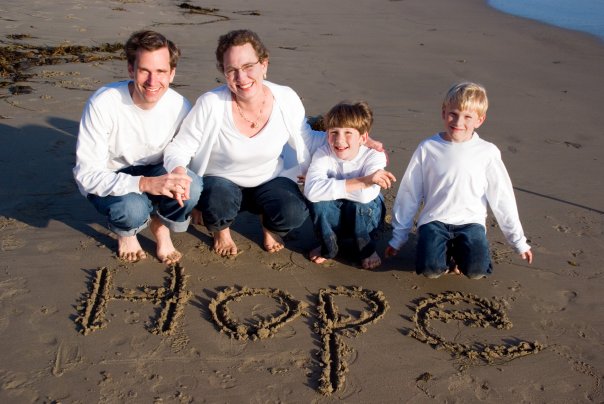In 1999, a baby boy was born in Australia. Like 9% of the population in Australia, his blood-type was O-negative. Being O-negative, he will be able to donate blood to anyone of any blood-type; he has "universal donor" blood. The odd thing about this blood type, though, is that if he is ever in need of a blood donation, it will have to come from another "universal donor". His body would consider all the other blood types enemy combatants, and do whatever it takes to get rid of the "problem".
While she was in the early phases of her pregnancy, the mother of that particular baby boy talked with her obstetrician about donating the cord blood from the leftover umbilical cord and placenta to the local cord blood bank. After the birth, that cord blood sat in a deep-freezer in Sydney for ten years before being put on an airplane and shipped half-way around the world to Los Angeles, ultimately finding its way into the bloodstream of Krista English, as a cure for her recurrent leukemia.
Krista, like 35.7% of the U.S. population had an A-positive blood-type. She could donate blood to any of the A- or O-types (A-positive, A-negative, O-positive, and O-negative), but she could only receive blood from A-positive or AB-positive donors. And that was who she was until the day that O-negative cord-blood came to town.
Once it moved in, everything started to change. But the strangest effect wasn't known until eight days later: Krista has changed blood-types, and now, like the 10 year old boy in Australia, she has developed a fortress against any other blood types than O-negative. And until her fledgling blood-factory is completed, there remains a big problem: she is now dependent on receiving blood and platelets that happens to be fairly rare. Only 6.6% of the U.S. population has O-negative blood.
The above story is true, and it has helped us understand why the past few days things have been extra difficult. Krista is low on platelets and there's a shortage of compatible donations. The blood bank has had some delays in getting the best (HLA-matched) platelets for her... maybe they'll come tomorrow? As a fall-back, they can give her platelets from a donor with negative-typed blood (preferably O-negative), but there aren't any negative-typed donations available. If they have to, as a last resort, they could give her positive-typed platelets, but the benefit would be minimal at best, as her body no longer welcomes that kind as her own.
Blood banks are always in need of blood and platelet donations. Whatever your blood type, please consider making regular blood and platelet donations. These things really save lives.
And if you happen to be a negative blood type, especially O-negative, and are near UCLA, please contact the UCLA Blood & Platelet Center:
* Phone: 310-825-0888 ext. 2
* Email: gotblood@ucla.edu
The negative-typed platelet supply is empty here. Krista could use your help, and there may be others that could benefit from your donation as well.
Trust in the LORD with all your heart
and lean not on your own understanding;
in all your ways acknowledge him,
and he will make your paths straight.
Do not be wise in your own eyes;
fear the LORD and shun evil.
This will bring health to your body
and nourishment to your bones.
Honor the LORD with your wealth,
with the firstfruits of all your crops;
then your barns will be filled to overflowing,
and your vats will brim over with new wine.
(Proverbs 3:5-10)

No comments:
Post a Comment